A round-up of activities of the UN system in Somalia in April 2025
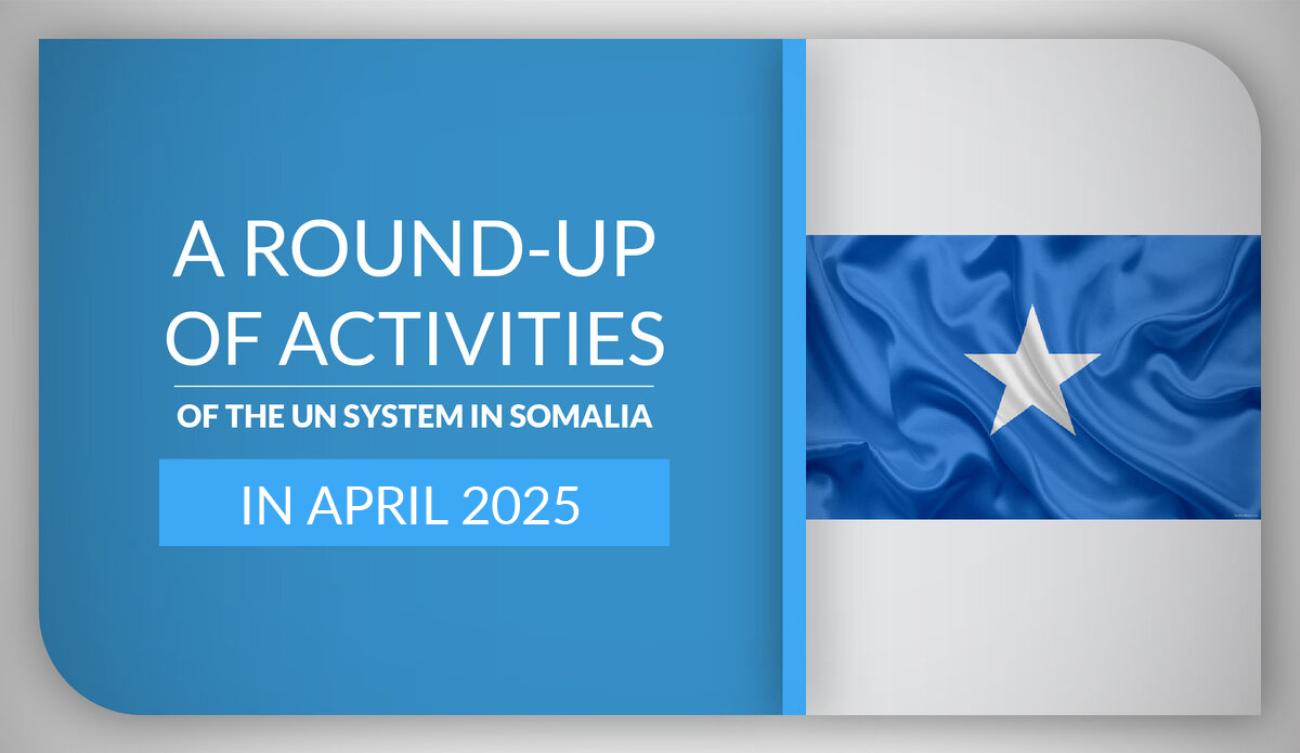
A snapshot of some of the activities of the UN in support of Somalia priorities
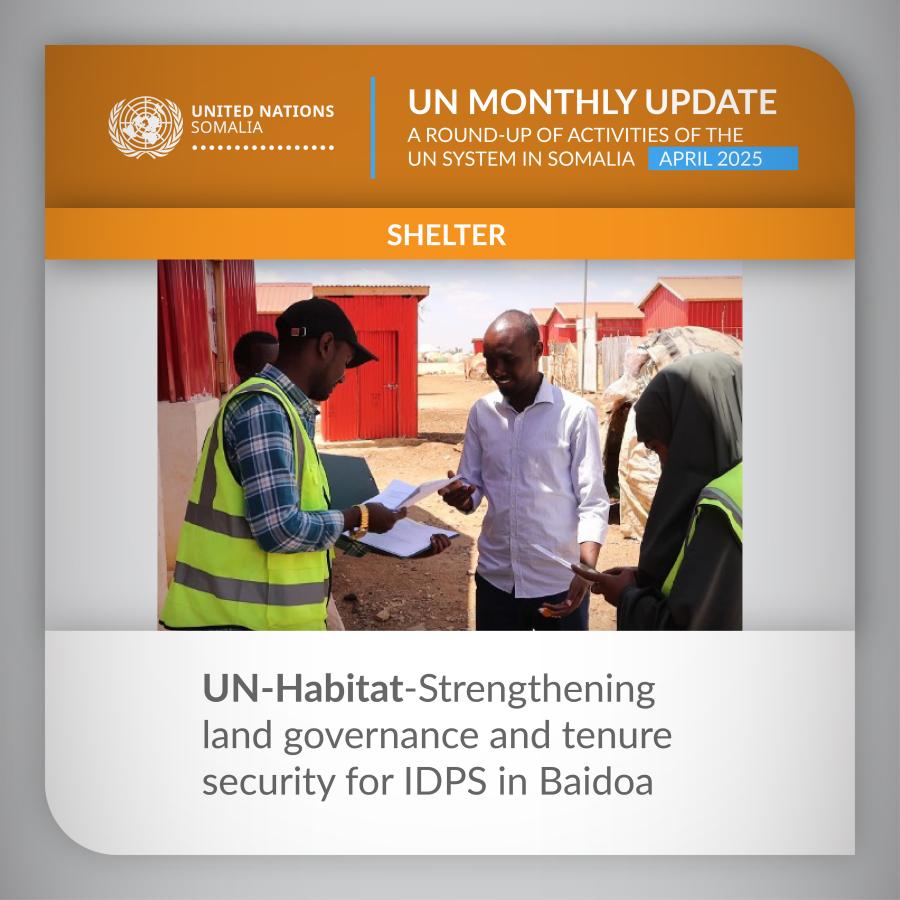
Shelter | Strengthening land governance and tenure security for IDPS in Baidoa
Supported by UN-Habitat and the Global Land Tool Network (GLTN), Baidoa Municipality has collected land data for over 750 households in Waberi and Horseed villages using the Social Tenure Domain Model (STDM). This is following a series of technical trainings held since December 2024, that have equipped the municipality’s land administration team with skills in data collection methods (using both manual and digital tools), data analysis, GIS, and participatory community engagement, laying the groundwork for more inclusive and secure land governance for internally displaced persons (IDPs).These initial outcomes also indicate improved municipal capacity to manage digital land records and increased community awareness of land rights. Investing in data collection initiatives is a strategic move for secure tenure, conflict reduction, and sustainable development. An accurate, up-to-date database is the backbone of effective land governance.
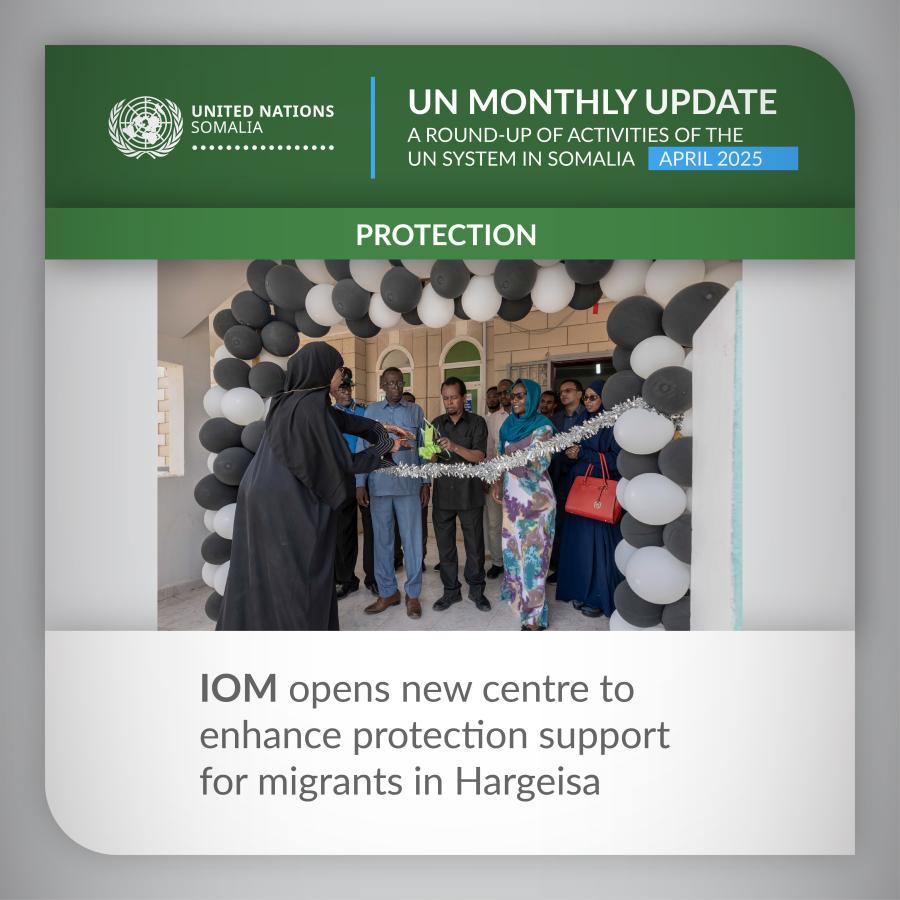
Protection | IOM opens new centre to enhance protection support for migrants in Hargeisa
The International Organization for Migration (IOM) has inaugurated a new Migrant Response Centre (MRC) in Hargeisa to bolster protection and assistance for migrants in the region. This facility aims to provide essential services, including shelter, medical care, and psychosocial support to vulnerable migrants, and particularly those affected by irregular migration routes. The centre also serves as a hub for coordination among stakeholders to address migration challenges effectively. This initiative underscores the commitment to ensuring safe, orderly, and humane migration in line with international standards.
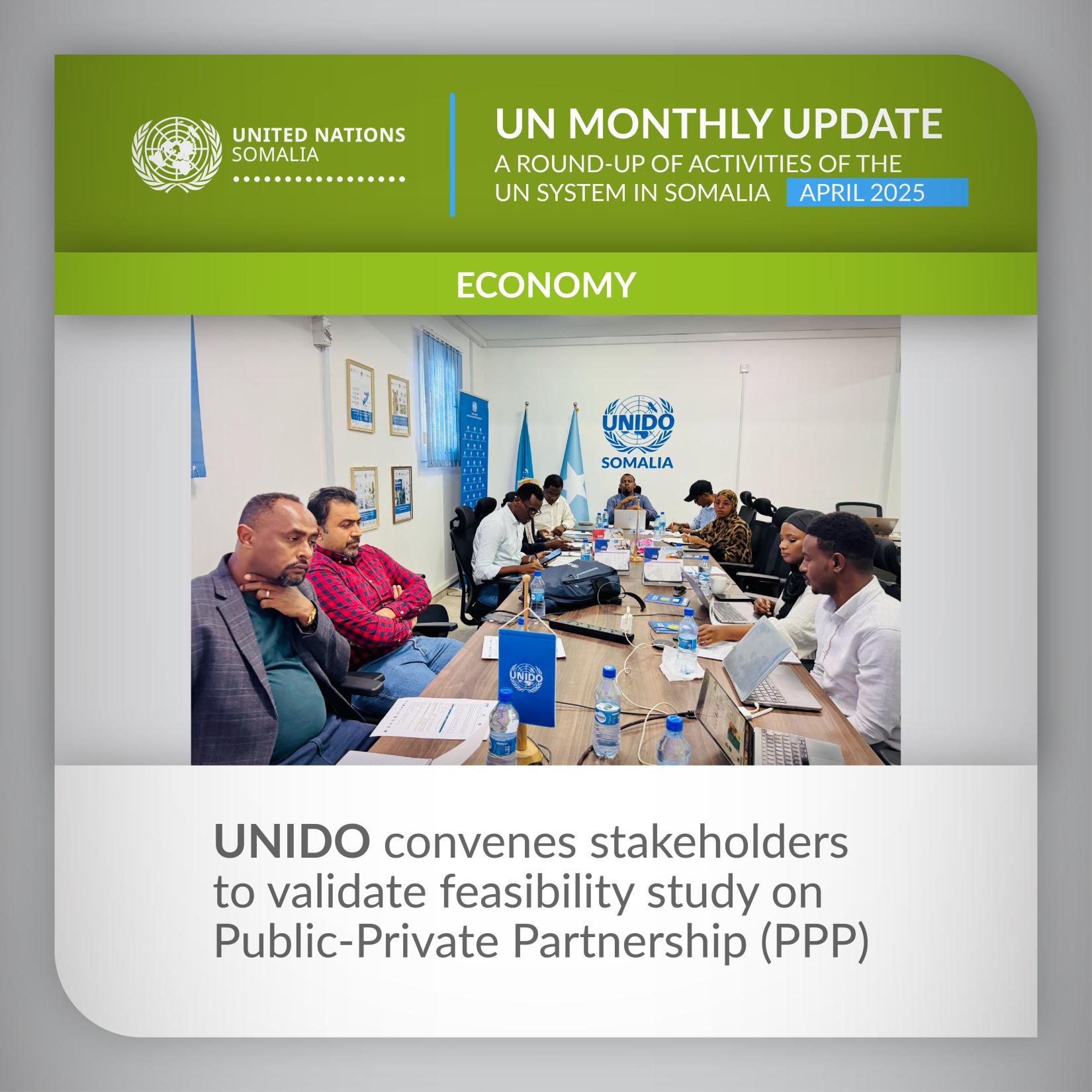
Economy| UNIDO convenes stakeholders to validate feasibility study on Public-Private Partnership (PPP)
UNIDO Somalia hosted a validation workshop in Mogadishu to present and review the draft pre-feasibility study for a Public-Private Partnership (PPP) model under the Jowhar Off-Stream Storage Programme (JOSP). The event brought together key stakeholders, including the Ministry of Agriculture and Irrigation, the Ministry of Energy and Water Resources of the Federal Republic of Somalia, FAO, and other partners. The workshop served as a platform to discuss the study’s findings and gather input to ensure a sustainable and inclusive PPP model that supports the long-term operation and maintenance of the JOSP infrastructure.
Participants emphasized the importance of stakeholder engagement, local ownership, and private sector participation in managing the water storage and irrigation infrastructures. This initiative aims to strengthen climate resilience, boost food production, and contribute to Somalia’s agro-industrial development. The validation marks a key milestone in moving toward the implementation of a model that will have a lasting impact on the Lower Shabelle region.
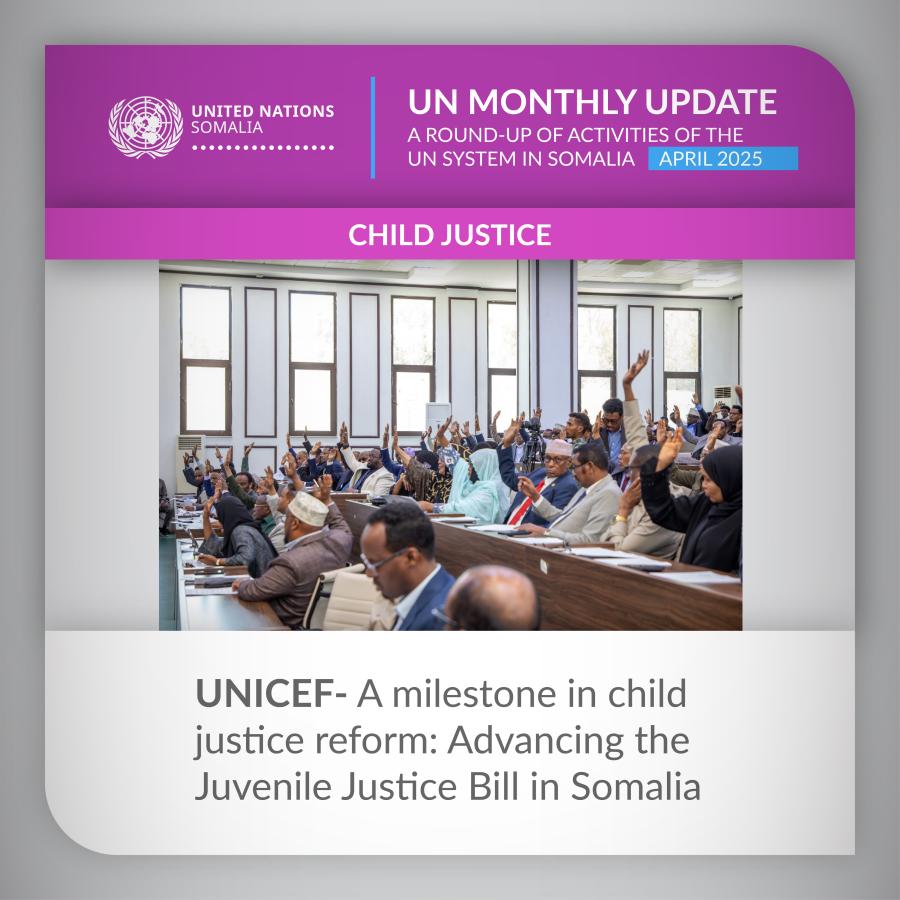
Child Justice| A milestone in child justice reform: Advancing the Juvenile Justice Bill in Somalia
In March 2025, Somalia’s House of the People passed the Juvenile Justice Bill, a pivotal moment in the country’s legal protections for children. Once endorsed by the Upper House, it will replace the 1960 Penal Code and Law No. 13 of 1970, which fall short of providing comprehensive protection for children. It is a culmination of years of technical and financial support from UNICEF, with support from Denmark, the Joint Programme on Human Rights Phase II, and the leadership of the Ministry of Justice and Constitutional Affairs.
The Bill profoundly shifts how the Somali child is treated and sets the age of criminal responsibility at 14. It also embraces principles of diversion, restorative justice, rehabilitation, and reintegration. Children in conflict or in contact with the law are treated with dignity, and clear guidelines on arrest, detention, legal aid, and sentencing offer them an opportunity to be reformed rather than punished.
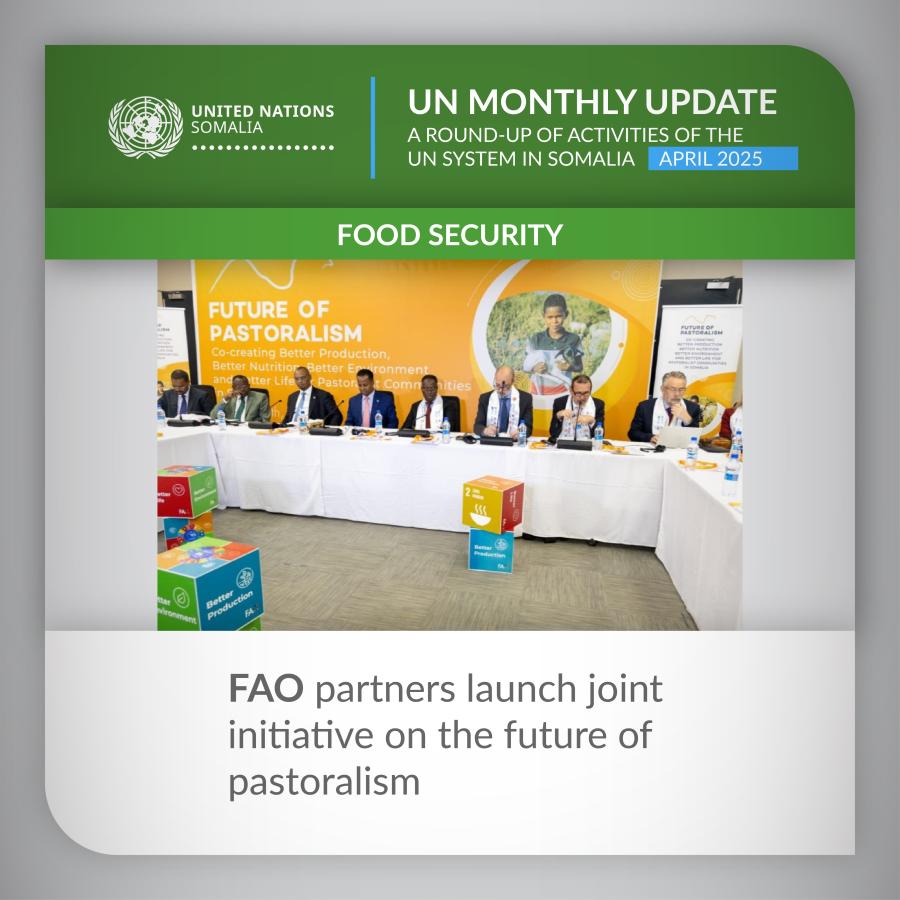
Food Security| FAO partners launch joint initiative on the future of pastoralism
FAO Somalia, in partnership with the Ministry of Livestock, Forestry and Range, and key UN and NGO partners, launched the Future of Pastoralism, a transformative initiative aimed at revitalizing pastoral livelihoods across Somalia’s arid and semi-arid lands. The initiative responds to climate shocks, recurrent droughts, and chronic vulnerability by establishing Pastoralist Development Hubs (PDHs), integrated service centres providing veterinary care, water access, markets, training, and managed rangelands. Anchored in national leadership and community ownership, the initiative is co-implemented with Action Against Hunger, IOM, WHO, and NRC.
The launch was officiated by H.E. Deputy Prime Minister Abdisalam Abdi Ali, who emphasized its role in shifting from crisis response to long-term resilience. This marks one of several Joint Transformative Initiatives (JTIs) under FAO’s strategy to reduce humanitarian dependence and strengthen rural development systems, aligned with Somalia’s National Transformation Plan (2025–2029).
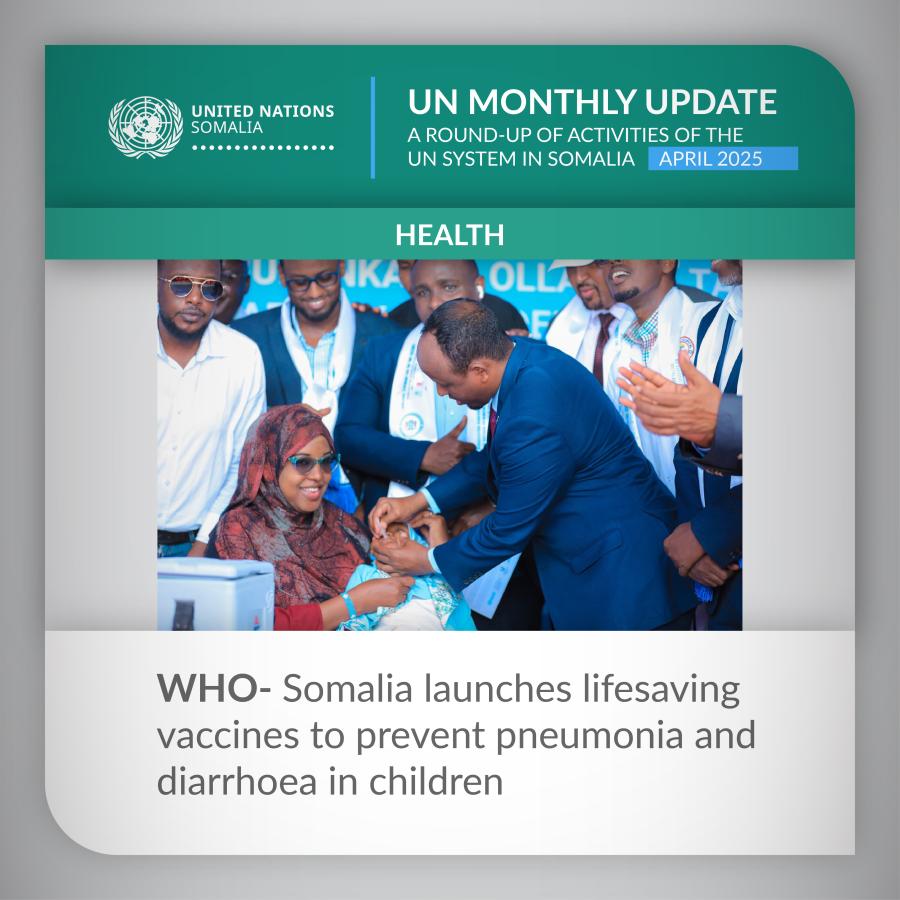
Health| Somalia launches lifesaving vaccines to prevent pneumonia and diarrhoea in children
The Federal Republic of Somalia has introduced two lifesaving vaccines into its national immunization programme – pneumococcal conjugate vaccine (PCV) and rotavirus vaccine – aimed at preventing pneumonia and diarrhoea in children. The country has also launched a nationwide measles catch-up campaign to combat one of the leading killers of children in the country. This integrated effort marks a major milestone in Somalia’s journey to reduce the prevalence of measles, pneumonia, and rotavirus-related diarrhoea, 3 of the most prevalent causes of disease and death in Somali children.
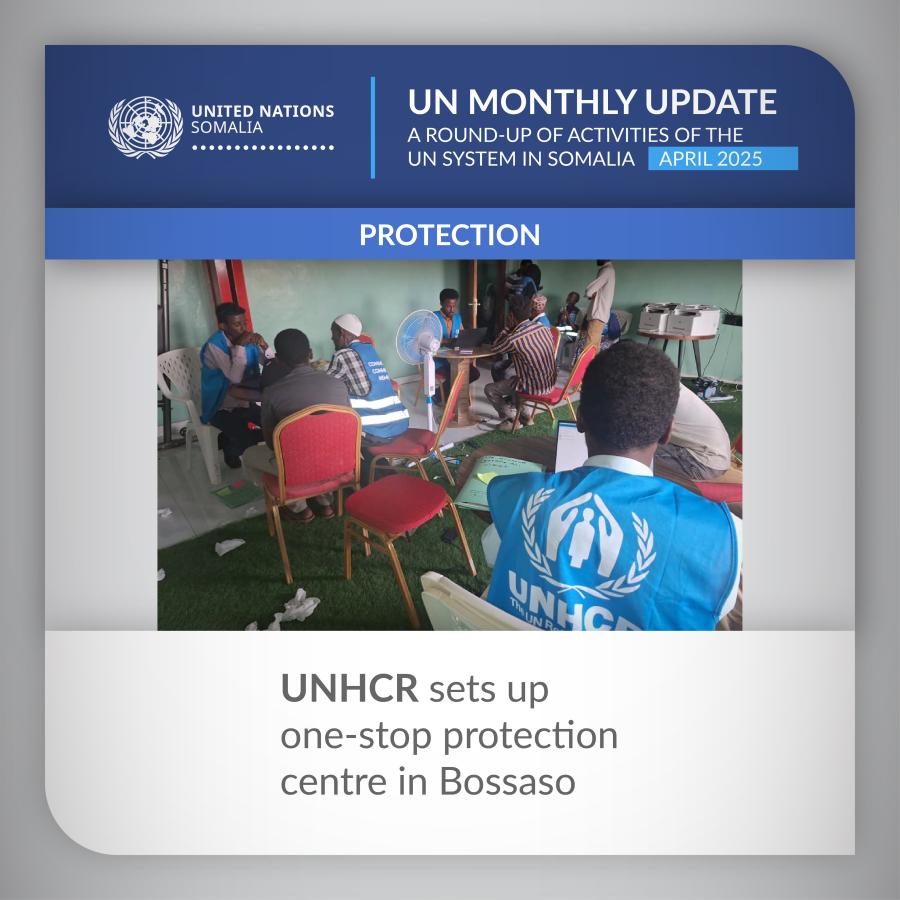
Protection| UNHCR sets up one-stop protection centre in Bossaso
In April, UNHCR in Bossaso, in collaboration with the Puntland Ministry of Interior, Federal Affairs and Democratization (MoIFAD), inaugurated a newly constructed one-stop protection centre designed to provide comprehensive and integrated services under one roof. The facility offers legal aid, psychosocial support, registration and documentation, and case management services for refugees, asylum-seekers, internally displaced persons (IDPs), and vulnerable members of the host community.
The initiative marks a key step in advancing access to critical protection services while reinforcing national ownership and sustainability of response mechanisms. By integrating services and aligning them with government structures, the centre ensures more efficient, dignified, and coordinated support to those most in need. UNHCR will continue to provide technical assistance to support the delivery of services through this platform.
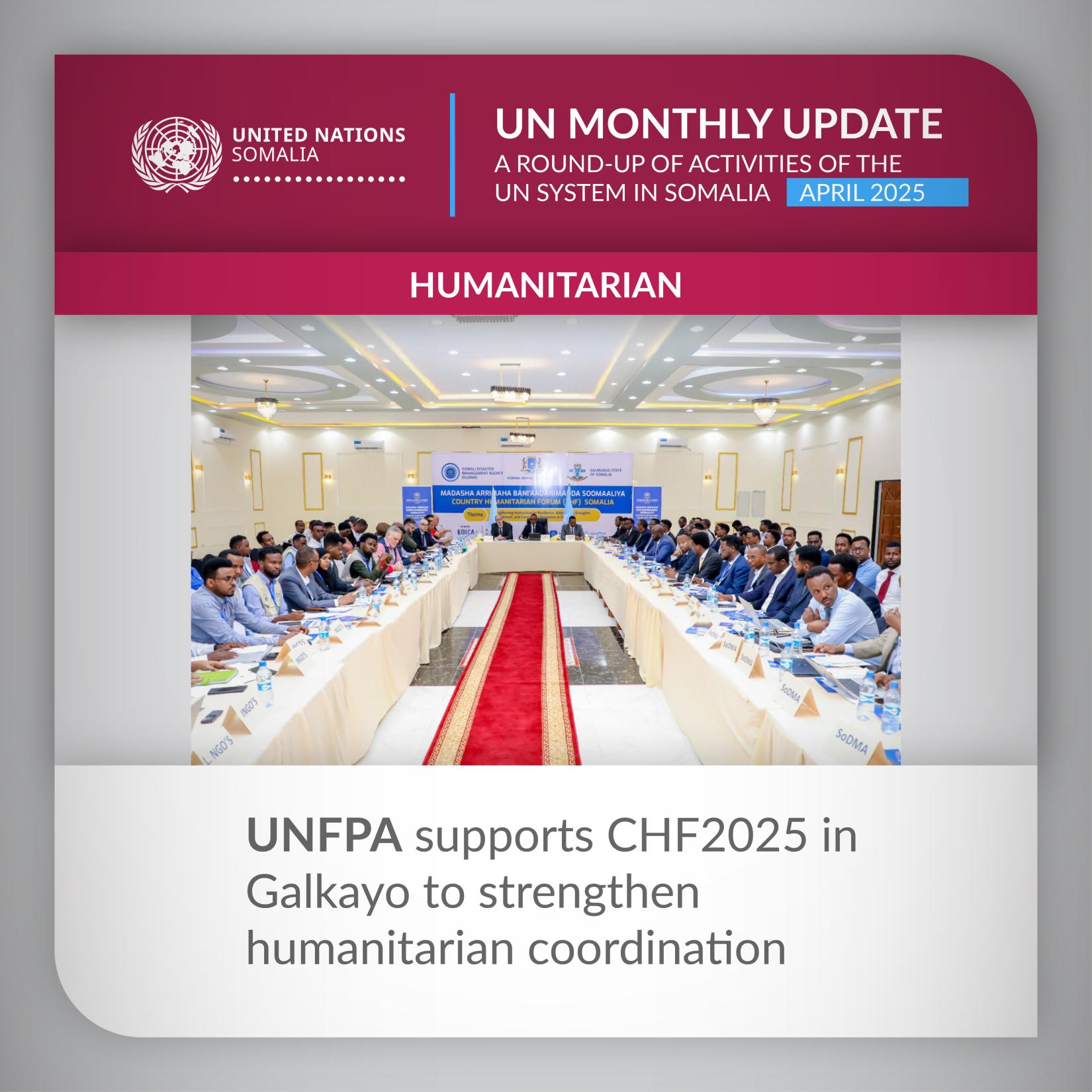
Humanitarian| UNFPA supports CHF2025 in Galkayo to strengthen humanitarian coordination.
In April, the UNFPA, with funding from the Korea International Cooperation Agency (KOICA), supported the Country Humanitarian Forum, which convened in Galkayo under the Somali Disaster Management Agency (SoDMA) and the Galmudug Ministry of Humanitarian Affairs. Participants included SoDMA leadership, the DG of NIRASomalia, Federal Member State ministers, regional and city administrations, UN agencies, international donors, civil society, and the Union of Islamic Clerics. The forum focused on enhancing coordination, sustainable climate solutions, and emergency response amid poor Deyr rains, an unfavourable Gu season, and La Niña risks. As a quarterly platform, CHF2025 reviewed progress, identified challenges, and set strategic priorities for Somalia’s humanitarian response.
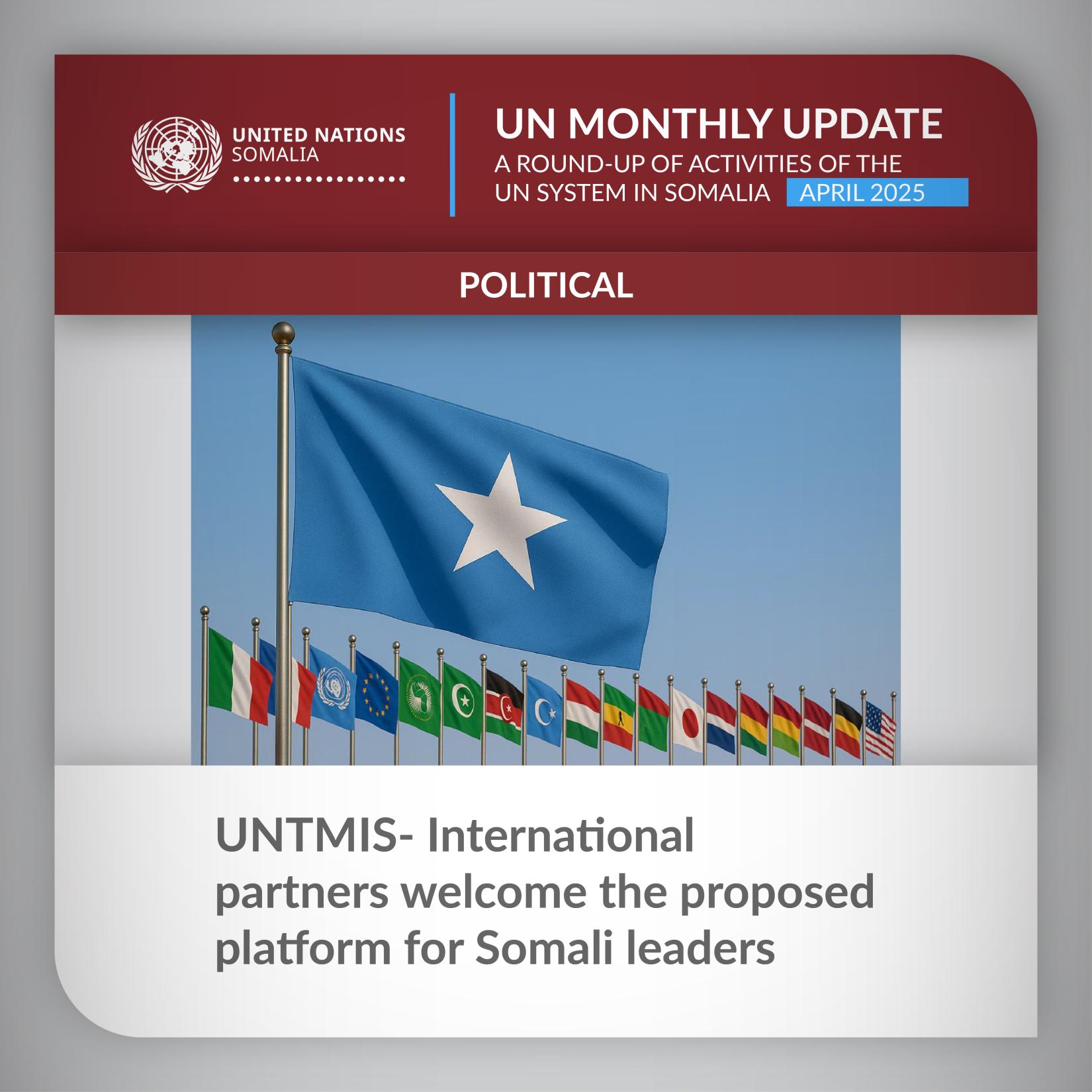
Political| International partners welcome the proposed platform for Somali leaders
In a joint statement issued via UNTMIS, international partners welcomed President Hassan Sheikh Mohamud’s proposal, contained in his Eid al-Fitr message, to establish a platform for Somali political and community leaders. They said that this initiative aims to incorporate their views and efforts into the fight against terrorism and advance Somalia’s state-building goals. The partners also praised positive reactions from key political figures and urged the Federal Government, Federal Member State leaders and other stakeholders to convene swiftly, treating Al-Shabaab’s offensive as an urgent national security priority. They emphasized that rapid progress on political, constitutional, and electoral issues would strengthen international support.
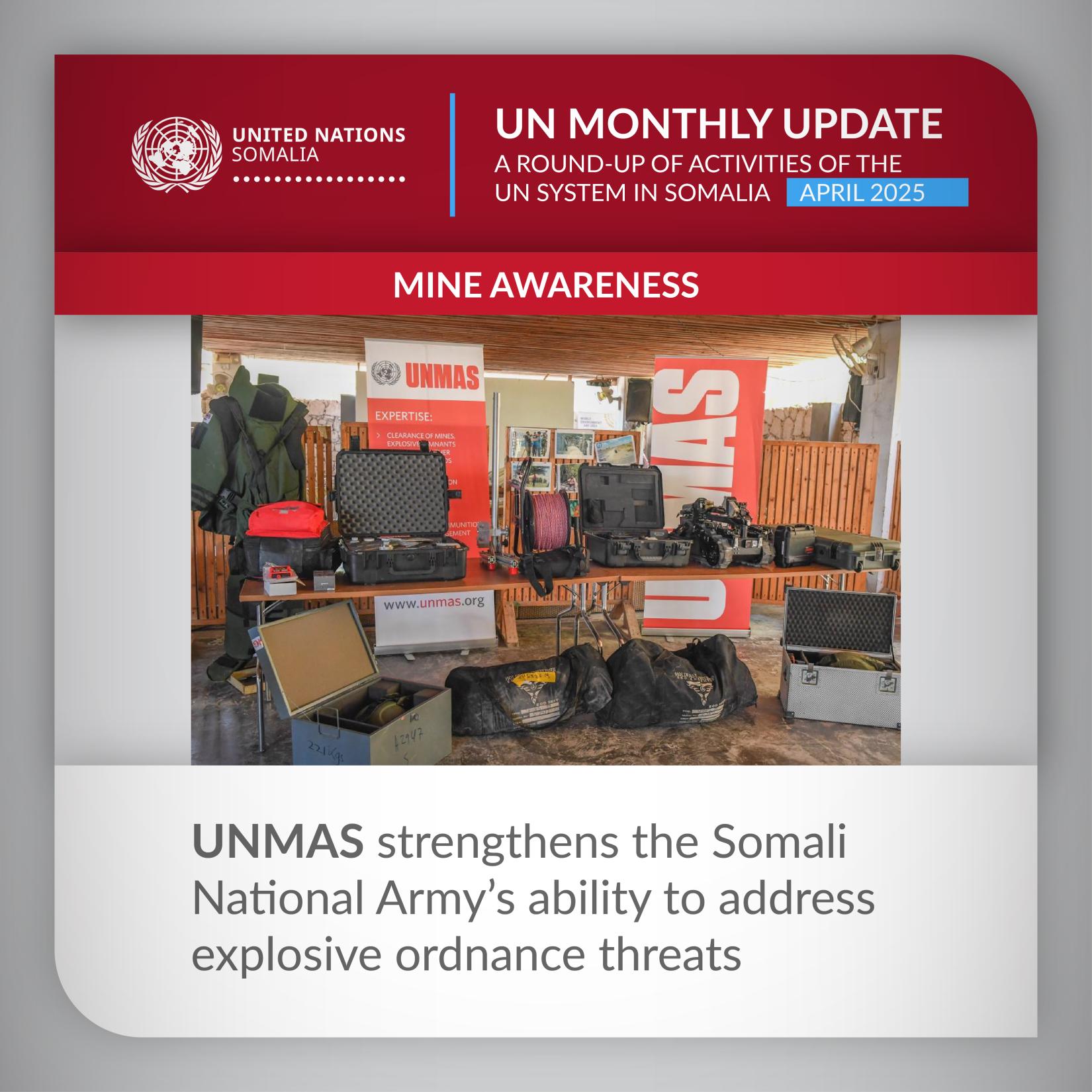
Security| UNMAS strengthens the Somali National Army’s ability to address explosive ordnance threats
UNMAS Somalia successfully completed a project aimed at strengthening the Somali National Army’s (SNA) capacity to mitigate the threat posed by explosive ordnance, including improvised explosive devices (IEDs), thereby enhancing the safety and security of the people of Somalia. This included the provision of vital equipment for three newly trained SNA explosive ordnance disposal (EOD) teams, along with training materials for a team of SNA instructors. This project, funded by the Government of the UK, will significantly enhance the SNA's operational capabilities and ensure their increasing self-reliance in managing and responding to explosive hazards, ultimately contributing to the government’s long-term goal of assuming full responsibility for mitigating explosive ordnance risks.
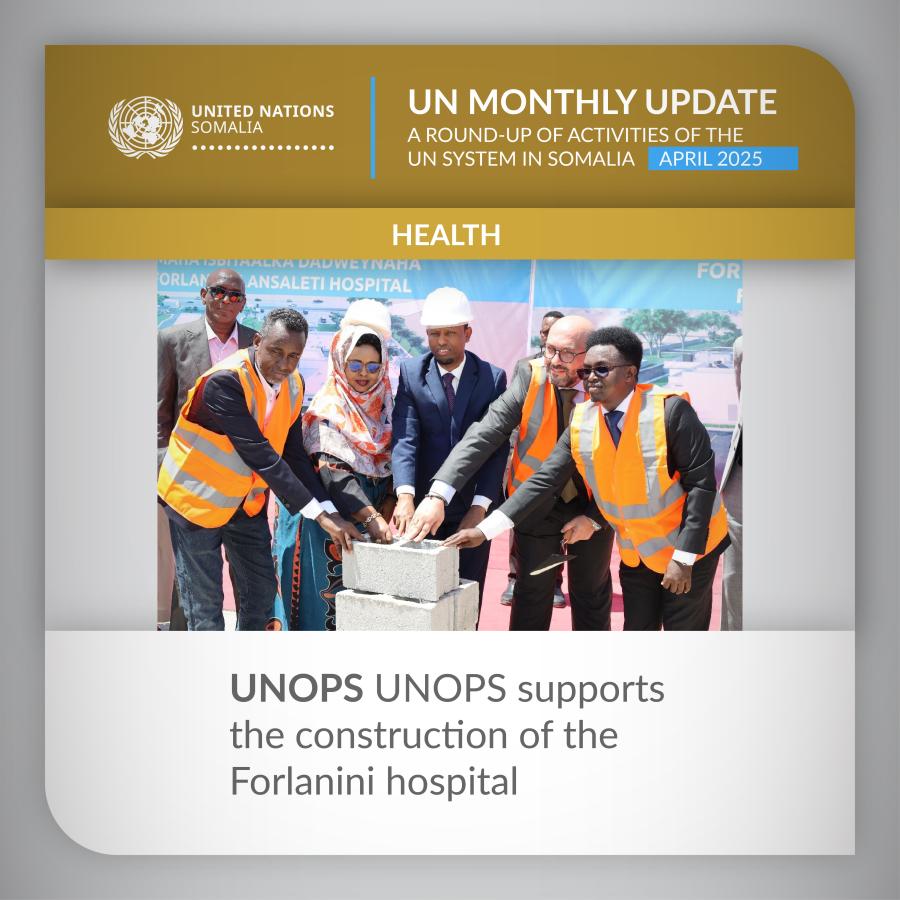
Health| UNOPS supports the construction of the Forlanini hospital
In April, with the support of the United Nations Office for Project Services(UNOPS), the Ministry of Health of the Federal Government of Somalia held a groundbreaking ceremony to officially launch the construction of Forlanini Hospital in Mogadishu, as part of an effort to enhance emergency response capacity at six hospitals in Somalia. Through the agreement signed between UNOPS and the Ministry of Health, funded by the World Bank, UNOPS is tasked with implementing this project. The scope includes constructing Somalia’s first cold chain facility at Forlanini Hospital and rehabilitating six regional hospitals across Somalia. The project aims to upgrade infrastructure and build emergency response capacity, including for climate emergencies. UNOPS' work includes renovations, civil works, medical equipment installation, and climate resilience measures. This initiative marks progress in healthcare infrastructure and emergency preparedness in Somalia.
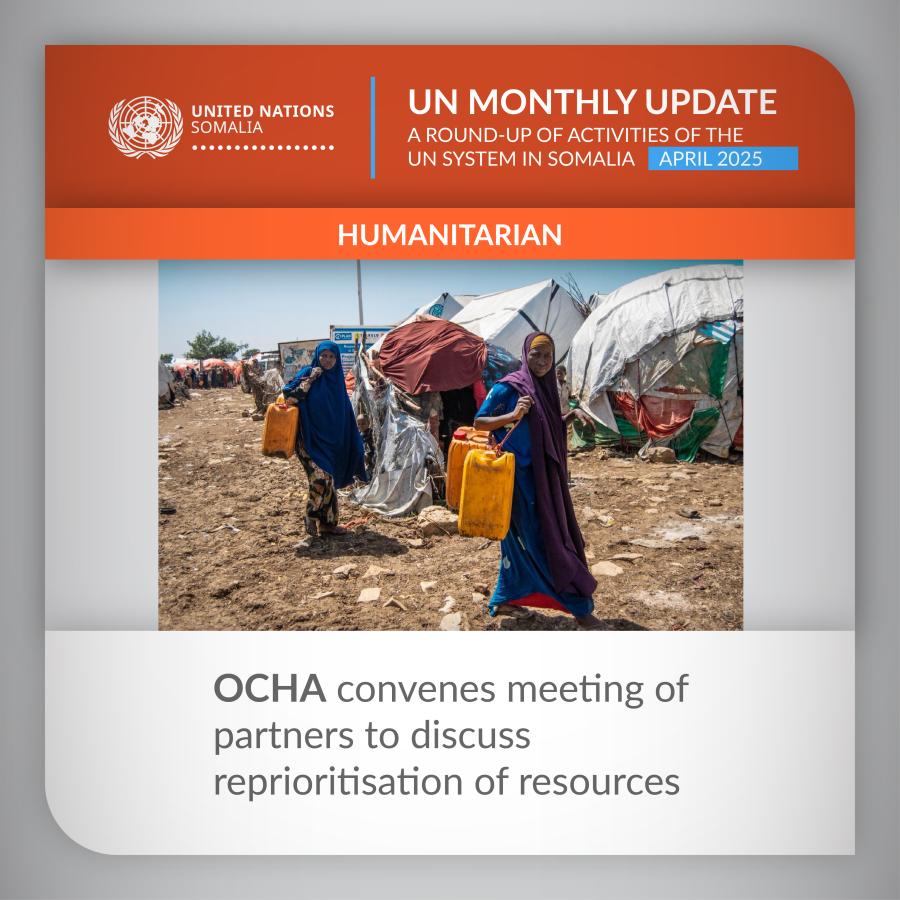
Humanitarian| OCHA convenes meeting of partners to discuss reprioritization of resources
In response to recent funding reductions, OCHA and the Inter-Cluster Coordination Group (ICCG) led partners to reprioritize resources to target only the 32 districts with the severe intersectoral needs. The reprioritisation will also focus on lifesaving Clusters – Food Security, Nutrition, Water and Sanitation, Health as well as Protection. Currently, the 2025 Humanitarian Needs and Response Plan is only 10 per cent funded. In response to recent funding reductions, OCHA and the Inter-Cluster Coordination Group (ICCG) led partners to reprioritize resources to target only the 32 districts with the severe intersectoral needs. The reprioritisation will also focus on lifesaving Clusters – Food Security, Nutrition, Water and Sanitation, Health as well as Protection. Currently, the 2025 Humanitarian Needs and Response Plan is only 10 per cent funded.
Click here for more

















